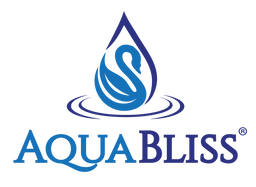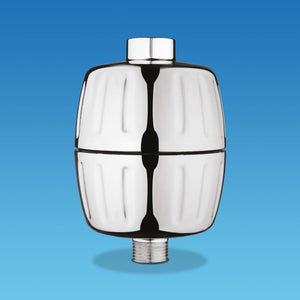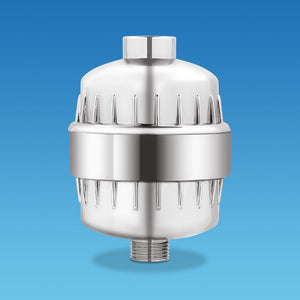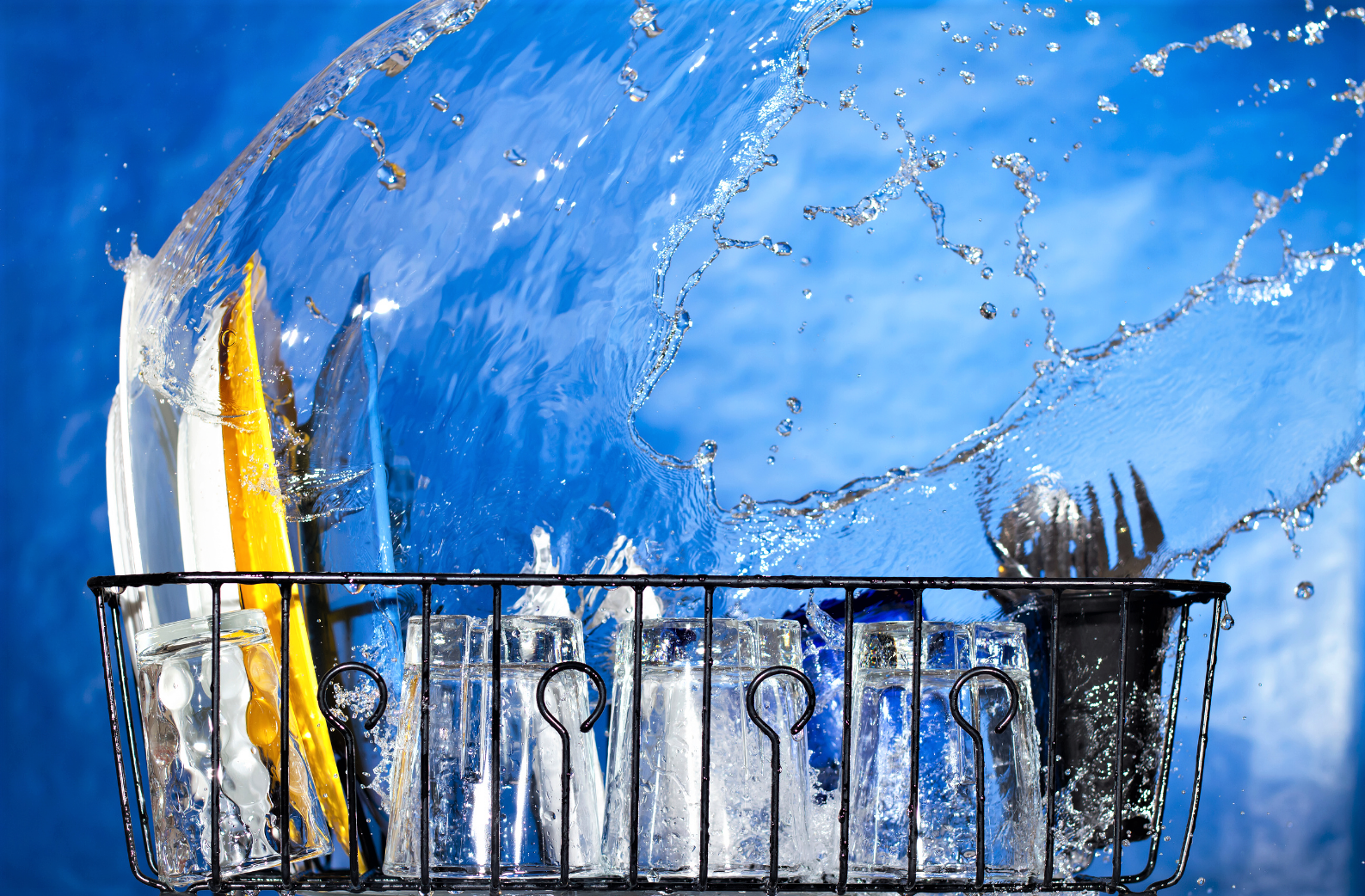Surprisingly, the ever-so-convenient dishwasher isn't the most essential kitchen appliance.
But should it be?
How much water is used in a dishwasher? The answer, often a point of curiosity for many, lies in understanding "dishwasher gallons per load." The truth about dishwasher water usage may surprise you.
Let's break down common dishwasher misconceptions and drop truth bombs on hand washing.
First Things First: Water Consumption of Dishwashers

So really, how much water does dishwasher use?
The short answer: 6 to 10 gallons of water per cycle.
Allow us to explain. Society questions the environmental impact of a dishwasher time and time again. Do dishwashers save more water or consume more water?
Answering the question “how much water does a dishwasher use?” boils down to the model and year of your machine, but newer versions have proven to be lighter on energy consumption.
Many still believe the appliance requires a large amount of water in order to be used.
Perhaps the assumption has been made due to the water load needed for earlier models. However, in newer versions of the appliance, how much water a dishwasher uses has been greatly reduced without compromising its sanitation systems.
Industry Standards for Water Consumption in Dishwashers
Earlier models of dishwashers used about 9-14 gallons of water per wash, and many people might have wondered, "How many gallons of water does a dishwasher use?"
These dishwashers date back to 1994 and have clearly evolved since then, leading to the development of more efficient dishwashers.
Nowadays, when considering how many gallons of water the average dishwasher uses, a conventional or average dishwasher uses 6 to 10 gallons of water per cycle, with energy use of 0.87-1.59 kWh per load.
This water usage was deemed too hefty by industry standards. As a result, the standard was then reduced to five gallons per cycle to be more water-efficient and not consume too much water on dishes.
How Many Gallons of Water Does a Modern Dishwasher Use?
Further appliance developments have produced dishwasher models with more water-conserving features, and many consumers might wonder, "How many gallons of water does a dishwasher use?"
These models are known most especially for their Energy Star rating, which is a program that certifies the energy efficiency of an appliance.
For dishwashers with an Energy Star rating, only four gallons of water per cycle is used. Compact Energy Star-rated models use only up to 2.7 gallons of water per cycle.
Such reductions in water usage can save almost 5,000 gallons per year, based on calculations made by the Department of Energy.
How Does A Dishwasher Work?

What good would this dishwashing VS hand-washing comparison be without explaining how dishwashers work? This is important to discuss, especially for those who have never seen a dishwasher at work.
Not only that, but you can’t know how much water a dishwasher uses without knowing how a dishwasher works first.
So how do most modern dishwashers fully get rid of food remnants on plates and utensils?
A dishwasher works through a number of sanitation processes once activated:
- Water is added and heated
- Detergent is applied
- Jet-like motors are used to clean the plates and utensils
- Dirty water is washed away with a final rinse
A dishwasher keeps track of the time it spends on a step and only requires a small portion of the bottom to be filled with water. Simply supply the dishwasher with its corresponding detergent and provide details on the dishware to be washed.
Exploring Advanced Features of Modern Dishwashers
Aside from thorough cleaning, all dishwashers are designed to remove food remnants and process excess food just as a garbage disposal would. Newer models, including Energy Star rated dishwashers, offer a menu of add-ons that elevate the wash cycle, such as sanitize, extra dry, and extra scrub.
Despite these features, research shows that a dishwasher is one of the least used appliances at home.
Now you might be wondering, should you switch to hand washing instead? That's what the next section is for.
Dishwashing VS Hand Washing
The two systems, both proficient, have long been a subject of debate amongst people, and here's a brief comparison of them.
How Much Water Does a Dishwasher Use Per Cycle?
As stated above, the average dishwasher uses only up to 10 gallons per cycle. Get your appliance from trusted dishwasher brands, and it could even slim down to less than 3 gallons per cycle.
How Much Water Does Hand Washing Use?
Hand washing will use up to 27 gallons of water to wash a full dishwasher's worth of dishes. That's a crazy amount in comparison to the maximum of 10 gallons per cycle of your average dishwasher.
Water used for an average clean-up via hand washing is 17 gallons more than the maximum expenditure dishwashers use. That's a huge amount of water consumed in a home.
Your water usage at home increases when washing your dishes by hand when you wait for your water to heat up. And when you do the math, those 27 gallons plus the water used for heating up is just way too much water.
So How Much Water Can You Save With Dishwasher Use?
When you wash dishes by hand, your temperature threshold can only go as far as your hands can handle. Washing dishes via a dishwasher can make use of higher temperatures since it is machine-operated.
This also means more in-depth sanitation due to the hot water heater.
The amount of water saved has improved dramatically for dishwasher models that pass the Department of Energy and Environmental Protection Agency Energy Star standards.
To further quantify the comparison, you can save up to $413 worth of water and energy by using dishwashers.
So, why are dishwashers the better choice?
Dishwashers use fewer amounts of water at home, therefore giving your home fewer expenses, all while being more environmentally friendly.
7 Dishwasher Water-Saving Tips to Maximize Your Savings

We all want to conserve water and lower expenses at home. That’s why it’s imperative to know how a dishwasher works and how much water a dishwasher uses.
At the same time, we don't want to sacrifice washing dishes to save water either.
Aside from dishwashers already saving more gallons of water as it is, you can reduce water usage even more through the following tips:
1. Scrape, but do not pre-rinse.
You can do without pre-rinsing your plates in the kitchen sink before placing them in the dishwasher. Ultimately, it eliminates the purpose of a dishwasher. It also unnecessarily increases your water use too.
If your dishes have large remnants of food like bones or thick sauce, you should definitely scrape them off using a utensil.
2. Minimize the wash cycle.
Wait for your dishwasher to have a full load before running a wash cycle. When you maximize the load size of your dishwasher, your energy use decreases as well.
It may get irritating having to wait for the dirty dishes to accumulate throughout the day or week. Just remember all the amounts of water you saved per load!
Note: It may be important to fill up the dishwasher to maximize the cycle, but you should also leave enough room for water to flow properly.
3. Always opt for an eco-friendly setting.
An Energy Star-rated dishwasher will most likely include an eco-friendly setting in its appliance. This feature allows you to use less water per load.
4. Use high-quality detergent.
Efficient dishwashers are never without high-quality detergents. The results of each cycle come out better when mixed with hot water and proper detergent, which means fewer expenses for you and less water usage for your home.
5. Maintain a clean dishwasher.
It is important to clean your dishwasher every now and then to unclog any remnants that might be stuck in between spray arms and filters. That way, you can truly maximize the use and product life of your appliance.
6. Repair right away when needed.
Nothing is quite as inconvenient as a giant appliance needing repair. People sometimes make the mistake of procrastinating getting a dishwasher repaired.
Prolonging the damage to your dishwasher could lead to bigger repairs or even permanent damage altogether, which could cost more to fix in the long run. The last thing you want is to go back to washing dishes by hand, so get to it right away to save money and avoid further issues.
7. Air dry your dishes.
Dishwasher cycles normally involve a heat drying step to cap off the process. It is recommended to skip the dry cycle feature of the machine to save energy and improve water efficiency at your home.
The next time you use your dishwasher, simply open the door of your appliance and let the dishes dry up naturally.
How Many Gallons Does Dishwasher Use?
The Answer: Significantly lesser than you thought!
Though it may be a heftier price to pay, you do reap the benefits well.
And if you follow the tips suggested above, you not only get your money's worth but conserve water too, which might make you wonder "how many gallons of water does a dishwasher use?"
Whether you are a dishwasher fanatic or a hand wash type of person, you can’t deny the wonders of a dishwasher. The worries of spending precious time at home in front of a sink are long gone, thanks to the advancement of this magical appliance.
Say goodbye to long minutes spent washing and drying. It's a win-win!
Final Thoughts
So there you have it! The answer to the commonly asked question: How much water does a dishwasher use?”
The answer is important because it illustrates how dishwashers are an efficient way to clean dishes and save water. They use less than half the amount of water as hand washing, and they can be set to run at night when your energy rates are lower.
If you’re looking for ways to improve the water quality in your home, installing a dishwasher is a great place to start. You may also invest in a filtration system to protect your hair and skin, and reduce toxins.
Find out more about us and how we can help or shop AquaBliss products to start using a clean water filtration system today.







